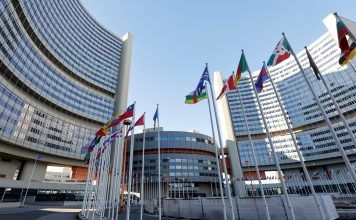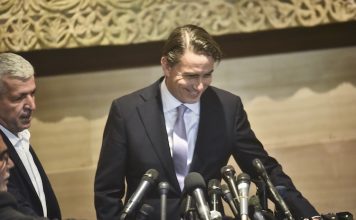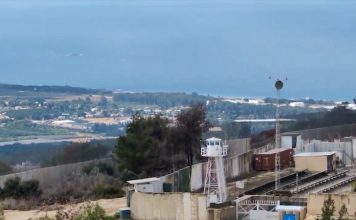NEW YORK, Sept 29 (Reuters) – Israeli Prime Minister Benjamin Netanyahu on Tuesday accused Lebanon’s Hezbollah of storing weapons near a gas company in a residential Beirut neighborhood, but the Iran-backed movement denied it.
Speaking in a video to the United Nations General Assembly, pre-recorded due to the coronavirus pandemic, Netanyahu warned the depot in the Jnah neighbourhood was “where the next explosion could take place”.
Lebanon has been pushed to breaking point by a financial meltdown and a massive August blast at Beirut port that killed nearly 200 people. Authorities have said highly explosive ammonium nitrate detonated after being kept in poor storage for years. Hezbollah has denied any involvement.
“I say to the people of Jnah … You’ve got to protest this. Because if this thing explodes, it’s another tragedy,” Netanyahu said. “Iran and Hezbollah have deliberately put you and your families in grave danger… You should tell them, tear these depots down.”
A photo displayed by Netanyahu during his speech, purporting to show the entrance to a missile factory, was taken on the ground in Beirut, suggesting an Israeli intelligence asset provided it.
Hezbollah leader Sayyed Hassan Nasrallah denied the existence of missile sites on Tuesday, accusing Netanyahu of trying to provoke Lebanese against the Shi’ite movement.
Shortly after Netanyahu’s speech, Hezbollah’s media centre took a large group of journalists on a tour of what it said was the site, on a crowded residential street in Jnah. In the building, described by Hezbollah as a factory, there were machines used to cut metal and some gas cylinders.
“There’s not a speck of what Netanyahu said in this factory. This is a private factory that makes metal pieces, with laser cutting machines and such, that’s all,” said Mohammad Rammal, who said he runs the factory. “These are lies, what more can I say?”
Heavily armed Hezbollah and Israel last fought a month-long war in 2006.
Speaking later on Tuesday to the General Assembly, Iranian diplomat Mohammad Reza Sahraei denied what he called Netanyahu’s “baseless and unfounded allegations.”
The Israeli military said in a statement it had reported the site, and others “numerous times, both to the U.N. and additional diplomatic networks, as well as via various media channels.” It urged the Lebanese government to intervene.
(Reporting by Michelle Nichols and Jeffrey Heller; Additional reporting by Alaa Kanaan, Raya Jalabi and Ellen Francis in Beirut; Editing by Bernadette Baum and Howard Goller)






